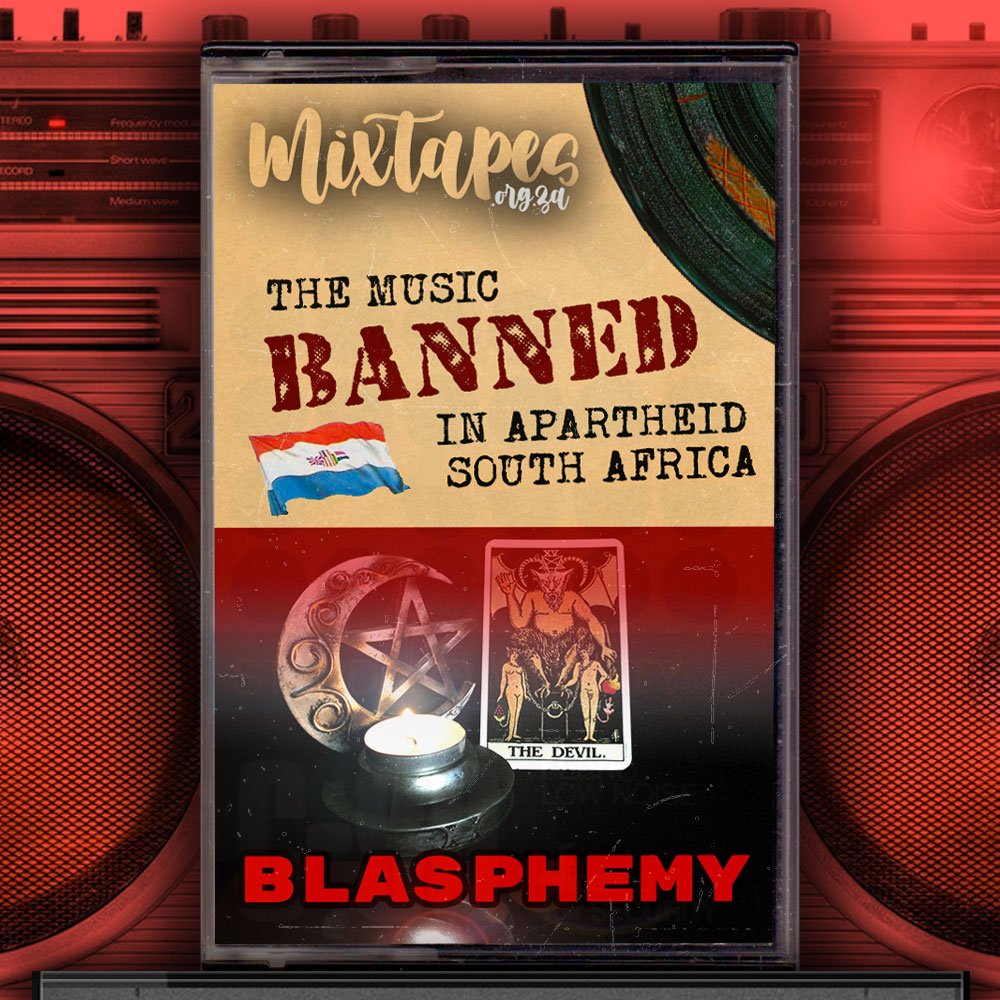
This mixtape focuses on songs banned by the apartheid government’s central censorship board because they were deemed blasphemous.
The apartheid government propagated a form of Calvinism so conservative and tainted that it justified apartheid, restricted nudity and sex to the procreative bedroom and exalted a bigoted and prudish god, whose sabbath was kept boringly sacred. It comes as no surprise therefore, that the central apartheid censors took a dim view on any song that undermined their narrow view of god, ridiculed Christians and, even worse, promoted Satan.
John Lennon’s “God” was banned simply because John Lennon stated that God is a concept and that he didn’t believe in the bible and Jesus. Meanwhile Chris De Burgh’s song “Spanish Train” was viewed as blasphemous because in the song God and the devil play chess and poker over the souls of the dead, and the devil cheats and wins more souls, without God realising.
Both Peter Sarstedt’s “Take Off Your Clothes” and Glenda Kemp’s “Strip Tea” raised the ire of the censors because they brought into disrepute men of the cloth, especially in a sexual context. In the former, because the protagonist’s “daddy is the pope you know, and I just want to grope you know” while in the latter, Glenda Kemp’s vicar comes to visit for a pastoral cup of tea but ends up partaking in an unexpected “Strip Tea”.
Don McLean’s “American Pie” offended the censors because of lines like: “No angel born in hell could break that Satan’s spell; And as the flames climbed high into the night; To light the sacrificial rite, I saw Satan laughing with delight” and “The father, son and holy ghost, they caught the last train for the coast.”
Two musicals based on the life of Jesus – Jesus Christ Superstar and Godspell – were controversially received by some Christians far and wide. The South African censors were no exception. They objected to the way Mary Magdalene tried to seduce Jesus on both soundtracks: Yvonne Elliman’s sensual “I Don’t Know How To Love Him” from Jesus Christ Superstar and Sonia Manzano’s burlesque-style “Turn Back, O Man” from Godspell, with the provocative line “C’mere Jesus, I’ve got something to show ya!” The theme song, “Superstar” from the former show, sung by Murray Head and the Trinidad Singers, was viewed as blasphemous for calling Jesus a superstar, banned by way of being a song on the album but also as a single.
The censors thought that Des & Dawn’s humorous treatment of ‘Dese Bones Gonna Rose Again” was unacceptable, and that the Kalahari Surfers’ protest about the SADF Maseru cross-border raid, through adapting the words to the Christian “Lord’s Prayer”, was equally unacceptable. Similarly, “Prayer” by Spooky Tooth and Pierre Henry was deemed undesirable by the censors, because of its use of the same prayer in a progressive rock context.
The censors strongly objected to Christ The Album by Crass; believing the album title was blasphemous, as were lyrics to the song “I Know There Is Love” which was critical of the role of Christianity in propagating war: “You’ve … thrust in my hands your gun and your bible, you told me to kill for the lord up above.”
“Ishmael” by Abdullah Ibrahim was the only song banned by the Directorate of Publications for reasons of blasphemy according to a religion other than Christianity. In this instance, the Muslim Judicial Council objected to Abdullah Ibrahim putting words from the Koran to a musical backing, an act which they deemed blasphemous, and which was upheld by the state censors.
The censors also objected to the name of a group called Satan and banned their album Court In The Act because of songs like “Hunt You Down”, which they argued promoted the power of Satan. Likewise, Mercyful Faith’s “The Oath” and “Mark Of The Beast” by The Sinyx (off the Crass Records Bullshit Detector compilation) were regarded as anti-Christian by means of promoting Satan. Finally, Diamanda Gala’s “The Litanies Of Satan”, affronted the censors, who objected to what she looked like on the cover, what she sounded like on the record and the fact that she prayed to Satan. The song and album were promptly banned.

